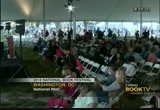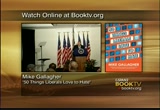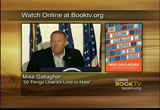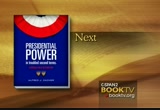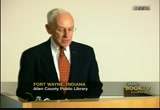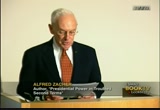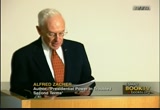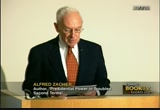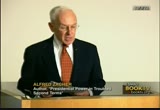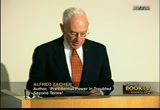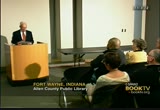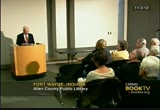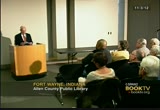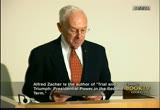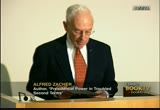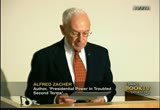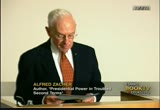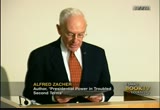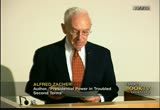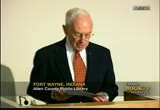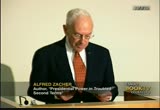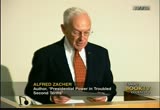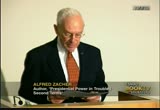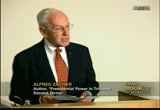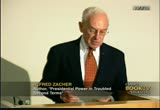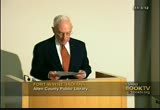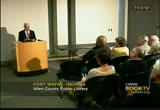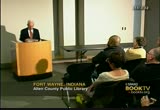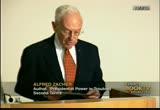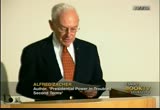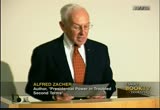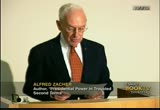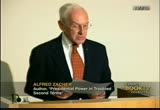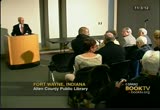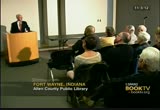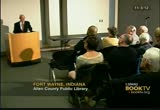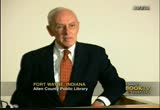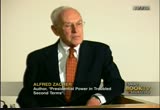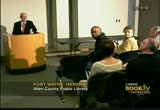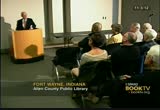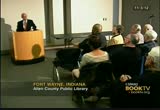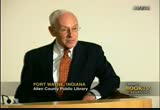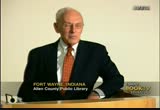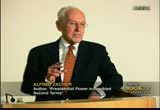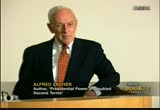tv Book TV CSPAN November 24, 2012 8:00am-8:45am EST
8:00 am
you in slightly less than 10 minutes. thanks for your patience. please stay with us and please thank our author, sally bedell smith. that was wonderful. >> we would like to hear from you. tweet as your feedback, twitter.com/booktv. >> this book is about liberals, not democrats, who are often not that much different from republicans in many respects. this book is dedicated to that peculiar brand of american who self identifies as a liberal, live life as a liberal and which is more of us in america were liberals, think michael more, think nancy pelosi, think your local college professor. think of the driver of that crazy car with all the bush is hitler bumper stickers on the back of the car. think the checkout help with the master's degree in gender
8:01 am
studies wearing the head band at your local whole food store. you get the picture, right? they dominate professions that we've a very large cultural imprint in this great country profession like journalism, the arts, academia, the music industry, america's fastest growing band of entertainers, sec this l.a. acrobats. who are these people who call themselves liberals? how does such a small tiny group leave such a big impact on our culture and lives? what motivates them? i am in an excellent position to answer these deep questions because i have been watching liberals closely for over 30 years. i have studied liberal like jane goodall studies her chimps. in their natural habitat. and without judgment. in silence mostly because we barely speak the same language. i have been tireless in my research. i have lived with liberal that
8:02 am
broke bread with a net humid and tease them and prodded them and imitated them and even loved some of them because some of my best friend the liberals. summary and members of my own family. my commitment to understanding liberal sometimes worried my good deer conservative friends with some even questioned my mental health. but i read the new yorker magazine. i went to see the vagina monologues. i listened to npr whenever i got the chance. i learned everything one could just buy tune in to all things considered. i even watched my car and footprint as much as a guy who loves big suvs can watch my car and foot print. what did i learn from my three decades of tireless research? liberals simply don't love many things about this world. they are endlessly trying to correct, picks, man and adjust every aspect of other people at the lives.
8:03 am
they spend a lot of time thinking about america's faults and how to correct them, america's ills and how to cure them. liberals love to hate things most americans love and spend the rest of their lives endlessly trying to take those things away from us and are convinced they do it all because they love us. thus was born this book, 50 things liberals love to hate. i hope you will enjoy it. >> you can watch this and other programs online at booktv.org. >> you are watching booktv. now alfred zacher presents his thoughts on why some presidents exceed and others failed in their second terms in office. this is about 45 minutes. >> good afternoon. appreciate your being here for this event we can credit c-span for our being here this
8:04 am
afternoon. we are familiar with the familiar phrase past is prologue which is emblazoned on the wall of the national archives. you have heard the phrase history does not repeat itself, it rhymes. this afternoon, with your assistance, i will attempt to apply this prologue to the history of the second term but i frankly do not understand history riming so that one will be ignored. we are once again facing the challenge of selecting our president when the winner is too close to call. we do not expect to witness an election won by a landslide. some will look longingly on the
8:05 am
time when one candidate dominated the political scene. lyndon johnson readily beat barry goldwater and richard nixon, overwhelming george mcgovern. each of those elections, one of the candidates failed to capture the spirit of the american voting public and the winner had the advantage of a weak opponent. franklin roosevelt won his second term landslide because of his huge popularity. however, in many more presidential elections, the candidates are in a pitted battle to present themselves as the one best capable of serving the country, with the winner walking off with a modest majority. there is customary wisdom, a campaign between the incumbent president and his opponent will be either a referendum on the
8:06 am
first term of the president or a judgment of which candidate will be the better leader. is there really a difference between these two considerations? does it not boil down to judging the leadership skill of the incumbent based on his effectiveness during his first term versus the unknown leadership skills of the challenger? it is easy to point to the national security or economic consequencess or consequent impact on the ratings of an incumbent as the indicator of the popular view of a sitting president. the public was not over enchanted with the war in iraq when george w. bush ran for reelection against john kerry, but voters by a small margin seemed to believe george bush would be the better leader. it cannot be said that the vote
8:07 am
reflected a referendum on george w. bush's first term. the importance of the communications skill of a candidate to not be discounted as a factor, however. but all of this misses a different valuation that needs to be taken into account in judging between incumbent barack obama and his challenger mitt romney. that is the jinx of the second term on many presidents. only seven of 19 presidents elective to a second term avoided having a troubled or failed second term. that would give the country about a 38% chance of obama and the nation experiencing an improved security and economic
8:08 am
climate after four years if obama is reelected. i do not suggest the gamble should not be taken. simply that history interplay in with politics might give us pause. what does history predict about a second term for barack obama? were he reelected with so few presidents having success at that time in office? what are the challenges that face those who had troubled or failed second terms? what allowed others to succeed? can barack obama overcome these challengess if he is reelected to become a member of that select group of presidents that waded through the quagmire of a second term and somehow came through relatively unscathed? success in a second term does not imply there were not
8:09 am
failures or significant stumbles. some even severe during that tenure but the net impact of that time in office had to be the fulfillment of a significant number of the following measures of success -- first, the president must provide defense against foreign or domestic threats. secondly the president must be -- expand economic, political and/or social opportunity. this becomes the primary challenge that the nation feels secure from military threats. third, the president must effectively lead congress. since the nation began, there has been a perennial confidence between the executive and legislative branches of government. most presidents will extend their exclusive bands of authority to the utmost. congress, on the other hand
8:10 am
generally seeks to limit the president's freedom of action. it is understood, however, that from time to time, setting such limits may be needed. for, the president must avoid a spirit of invincibility, of hubris which might cause the president to lose touch with the political reality. the president must exercise influence over and effectively communicate with the nation, the able to communicate persuasively. the majority of the american people must believe in the president's integrity and sustain a substantial level of pride in the president throughout the eight years in office despite specific shortcomings. he must have strengthened the nation on balance by his actions.
8:11 am
the president must lead a legacy to the nation. the list of those who prevailed in their second term includes george washington, james madison, and rejection, theodore roosevelt, dwight eisenhower, ronald reagan and bill clinton. lincoln is a special case and that his successful second term was so brief. it is interesting to note-only presidents who had a more successful second term than their first word james madison and andrew jackson. the following is an accounting of the president's elected to a second term and the reason for those of experience failed or troubled second terms. four failed because of a war that seemed unwinnable war for
8:12 am
lack of preparedness. jefferson, truman, johnson and. were the four. also four failed because of economic crisis or failure to act to deter such a crisis. jefferson, cleveland, coolidge, franklin roosevelt, the 37 downturn and george bush. eight who failed due to their inability to lead congress were jefferson, monroe, grant, wilson, truman, johnson, nixon and george bush. two failed due to who boris. franklin roosevelt and richard nixon. four who did not effectively communicate their agendas or initiatives were jefferson, monroe, grand and cleveland.
8:13 am
the dominant force of failure for a second term presidents has been there in the ability to successfully to work with congress. lee eight second term presidents have face trouble their second term due directly to the fight between congress and the white house. having a congressional majority of their own party is no assurance of relief. those presidents who served with the congress having majority of the opposing party during a second term included wilson, eisenhower, nixon, reagan and clinton. the competitive battle between a president and congress bates to the fight george washington had with congress over the jay treaty and. he had won approval only after considerable effort working directly with members of congress, compromising and cajoling.
8:14 am
that was with the congress having a majority of right thinking federalists and a president who is revered as a national hero. when the democrats won a majority in congress eisenhower worked quietly behind the scenes with the senate majority leader lyndon johnson to gain approval of his legislative agenda. ronald reagan developed a close relationship with democratic speaker of the house tip o'neill. somehow fulfill his legislative goals, compromise as they were. it might be cynical to postulate some of nixon's liberal legislation was prompted by his desire to get along with a democratic controlled congress. woodrow wilson was a target of the republican party that wanted to even many a squabble with the
8:15 am
president. he defeated william howard taft and theodore roosevelt. and the league of nations. that would vent republican party hostility to wilson. the treaty was never approved, the votes were there for approval for the president allowed to compromise but wilson stood firm. was the president, not congress who refused to compromise. one of the most successful relationships between a president and congress occurred during the second administration of bill clinton. he encourage the democratic party to move more closely to the center politically well below he ran for president. his welfare legislation
8:16 am
reflected that. and formulating debt and tax reduction legislation that led to a budget surplus, the touchstone for success in working with the opposing party to fulfil a president legislative agenda. quintin appointed erskine bowles to represent him in negotiations with congress. erskine bowles's great talent was important in reaching the president's legislative agenda so this was followed by the same house of representatives voting to impeach bill clinton. obviously an extreme example of the age-old conflict between congress and the executive branch of government and bill clinton is listed among only seven reelected presidents who
8:17 am
were successful. there are lessons to be learned from the clinton's second term that might offer guidance to obama where he reelected. some of the presidents who face hostility through congress, fill a majority of their own party including washington, jefferson, monroe, grand, theodore roosevelt, johnson and george bush. en route jackson was censured by congress controlled by his undemocratic party. it is like he never forgave. franklin roosevelt had a constant battle with southern democrats who opposed his new deal legislation. he suffered his greatest political defeat and the democratic controlled congress refused to support his plan to pass the supreme court. eisenhower, a republican, fought legislation drafted by a fellow
8:18 am
republican of ohio who sought to take away presidential power. what this paper is all about, however, is what we might expect in four years of a second term for barack obama. where he reelected, obama in all probability would face the daunting challenge of working with republican majorities in house and possibly in the senate. what lessons might obama learn from history were he reelected? confronted with a congress dominated by republicans, further complicating this challenge is apparent disappearance of the spirit of compromise which has been a mainstay of legislation throughout the nation's history with one very momentous exception. members of congress in the south would not compromise on the
8:19 am
subject of the expansion of slavery. 11 states seceded and the civil war ensued. we heard much about the impending battle between the president and congress over the extension of the george bush tax cuts, raging the debt limit and potential of automatic cuts in spending. necessity of resolving these issues is what ben bernanke refers to as a fiscal cliff. it is likely these critical decisions will be given brief extensions so that the next president and congress will be saddled with making the decisions. as a second term president, obama would face obstacles rarely experienced by achieved executive returning to office where he would face sizable numbers of members of the senate and house who will not
8:20 am
compromise. these present ominous clouds on the horizon for a second term for obama. other lessons obama and the electorate can learn from the experience of presidential history might give guidance for the resolution of this concern. first, however, it would be helpful to review obama's background and customary evaluation of him. his opponents and some of his supporters asked does barack obama have the leadership skills, experience, cultural background and temperament to deserve a second term as president of the united states? his opponents say no to all of the above and add they consider him to have socialist tendencies including his desire to copy european foundations -- i am
8:21 am
sorry. i skipped a page. to desire to copy european government economic policies as a basis for the campaign to deny him the office. the liberal democratic party keith fergus complain -- complains he compromised excessively in expanding the keith fergus complain -- complains he compromised excessively in expanding the debt level and other legislation. they express concern he did not appear to be a decisive leader with such legislation or in the management of the health care proposals. some of his supporters believe congress was given free rein in the design of health care plan and accused of destroying by
8:22 am
partisanship by independents who are concerned by what they see as the inability to meet and negotiate with republican opposition. there can be no question that obama lacked experience in government either as governor or as a long-term member of congress on any phase of business. further his background in academics and as a community organizer offers no evidence of someone who has the fire in his belly to be a leader. he has primarily been a teacher, counselor, adviser and mentor. he had customarily preferred to be very thoughtful in taking time before responding to requests for advice or opinions on matters. he had no experience in negotiations at a level preparing to meet the republican congressional leaders or
8:23 am
international heads of state. he had no experience or even academic training in either economic or complexity of government finance. obama had no experience in initiating legislation that might have assisted him in structuring a strategy with health care legislation. taking this ineublerience into account it almost appears obama stnegped out of character as a person who aggressively fought as a state lts wislator, united states senator and president of the united states. obama obviously had to learn all that was required to be president through on-the-job training. it is possible to conclude, however, assuming the legislation passed during his first term, obama is a quick learner. he grappled with the challenges and economic crisis and formulation of the stimulus
8:24 am
package haltingly meaning heavily on his economic advisers. the most appropriate, and on the stimulus program was the nation did not falter and some economic expansion is occurring. the bailout of the automobile industry seems to be a success. the health care legislation fre vuently lacked presidential leadership and the judgment of most observers, the final configuration is yet to be determined. all this took place with minimal eublerience. how well is obama meeting the six measures of a successful president? he is probably seen as protecting america with the use of drones and special forces, killing osama bin laden and members of al qaeda. his withdrawal of troops from iraq and plans for their removal
8:25 am
from afghanistan is grmeetited h approval by the majority of americans. at the moment obama appears to be fulfilling the task of security for the nation. although the rise of anti-american uprisings, killing of our ambassador in libya and success of the taliban afghanistan has minimally raised the issue of the defense of the nation as an ingredient in the coming election. is obama providing economic opportunity? he inherited the worst economic crisis since the great depression but the president is now held responsible for a continuation of high unemployment and minimal hope for its improvement and also for increases in the debt and deficit. his job lts wislation proposals are not being well-received by republicans. the administration has not propose any innovative resolutions for the severe
8:26 am
downturn in housing. some believe he should have supported and promoted simpson-bowles deficit reduction proposal. he has not bmeetin rtele to significantly expand economic opportunity. how has obamaarased the tobsls leadership? he attempts to communicate his vision and proposal but he has appeared so often on television that overeublosure was occurrinr he is a capable public speaker but his speeches lack the spirit he showed during his first campaign. he seems to lacversthe coficunication skills of fdr, reagan or clinton. obama frequen-by comes across as a teacher or a motivator and not a motivator. he fails frequen-by to excite and motivate the broad public he must reach though he is not doing badly in the current
8:27 am
campaign. there is a recent article in a sunday edition of the newshorves times entitled to obama plays to win in politics and everything else. the author paints a picture of obama that gives greater insight into him and how he might function as a second term president. i am quoting from that article. four years ago barack obama seemed as mps he might be a deliberate professor of a leadeumi maybe with a touch of hawaiian mellonnests. he has turned out to be of voraciously competitive professional. aides and friends sng f so in intervito mr obama's own words of praise and the russians sng f it best. he is a perpetual acatiring
8:28 am
overachiever. as he faces off with mitt romney, mumi obamas. and fear of losing is in over3 ive. he is craficing for debate against an opponent, called ineto frantic pace to narrow the gap with mr. romney and embracing do anything it takes of an increasingly contentious campai a . even by the standarmpl of political worlds mr. obama's obsession with virtuosity, proving hiublielf the best, are remarkable. those close to him say -- critics call it arrogance -- when mr. obama was derided as an overachiever in an eao ny political race his friends were infuriated. even those lbutal to onne iobam say his quest for excellence can
8:29 am
lead into cockiness and he tenml to overestimate his capability. so what should one predict a ort a second term for baracversobam? particularly with these qualities of character? he most recently exhibited a combination of moving to the center while some hnove detecte his class warfare, targeting the weast of the house john boehner states the president backed away from an agrmeetid compromise on rais the debt limit. an article in the nto tinagazine tenmpl to support th charge. a recent orok by bob wobsdward paints a picture of obama standing firm against john oriesner in the nts wotiations. the apparent requirement for resolution of major muscle patient approaches and appears even more rigid positions are being forecast for the next
8:30 am
8:31 am
programs. he should encourage congress to enact an annual budget which has not occurred for the past three years. he might come up with a proposal for inventive public/private partnerships to improve infrastructure including the electric grid. and, of course, continue to encourage any energy independence. a resolution of the supply of unsold houses should be sought, but all of this will occur only if a reelected barack obama can somehow find the unique temperament required to work with his administration to move to the center and discover ways to reach meaningful compromise with a congress willing to pass legislation this country so desperately needs. although it is not a subject of this paper, one can ask, will he be reelected? historically, rarely have presidents been reelected to a second term with popularity
8:32 am
ratings in the 40% level, which is where obama rests. but so does romney. it is interesting to note that only three of 19 presidents elected to a second term had relatively less popularity ratings at the time of their re-election -- had relatively low popularity ratings at the time of their re-election. these were woodrow wilson, harry truman and george w. bush. these presidents experienced troubled or failed second terms. history aside, one cannot discount the possibility that obama would win not based on statistics like this, but because the electorate judges him the best alternative of the two candidates. success in a second term for obama is another matter, however. thank you. [applause] we really would welcome
8:33 am
questions. it would be an advantage to c-span to have question and answer period. maybe some of you will reply to the questions that come from the audience, and we'd like you to participate as fully as you can. you see there's a microphone overhead that they'd like to take questions. do any of you have any questions? yes. >> al, i thought that was a remarkably objective and even-handed treatment and very insightful. thank you so much. my question is given that the president's opponents in the congress have made no bones about their goal to make him a one-term president, have you seen in your research any other situations that quite compare to that level of directness in terms of that kind of a goal? >> and to follow it, you're saying that they actually
8:34 am
planned in the first term to oppose the president extensively so as to deny him a second term. that's a very fair question. i would say that -- and that would then require a congress of the opposing party, in other words, where we had those presidents that had their own party in power that would not occur. well, i would think that clinton, interestingly enough, in contrast to that his center of the road, his welfare program was in the first term, and, therefore, he did get unexpected support, although where possible that congress opposed him wherever they could find -- and all the investigations. so there'd be a good example
8:35 am
where they did everything they could to deny him a second term. that'd be just one example. and i -- oh, yes. wilson, wilson suffered some of that, but it wasn't til his second term that he had a republican congress. and looking back, i think clinton would be an easy answer to that. any other questions? yes. >> if the president is reelected, will he have, like, only two years to get anything done before the next election cycle starts? >> does he turn into a lame duck rather promptly? it takes a very highly-regarded president to avoid that. and that's one reason you notice
8:36 am
that only really two presidents had more effective second terms than first, because it's that first two years of the second term is the only chance of getting much done. reagan, i say, is an exception to that, but that was in foreign affairs. not domestic. and the lame duck problem occurs pretty much after the -- it's a rare president who in the last two years of his second term has an effective time. any other questions in -- any other questions? yes. >> al, i'd like to ask a question about woodrow wilson. i understand that he wanted to get the league of nations passed and was not able to do that. what little i know about the league of nations, seemed like it would have been a good thing. why wasn't he able to get it
8:37 am
passed? was it strictly political? or why not? >> that's -- his opponents in the party recognized his weakness of demanding that his plans be accepted. and so they selected only one major item, that is the right of the league to bring the member nations to war, to battle. and that -- you notice the united nations does not have, does not give the nations that right, particularly because the lessons from the league of nations. and they, he -- the congress said they would gladly redesign the league. in fact, the european nations all said just ask us, we'll
8:38 am
remove that. rerefuseed -- he refused. he simply, and the republicans knew that he was that rigid in his nature, and they just selected that, and they just played it to their success. very definitely. yes. there's a question back there. >> it's entirely possible that barack obama may win the electoral vote and may either lose the popular vote or the popular vote may be very close. what effect is that likely to have on his performance in the second term? >> the implication is the weakness that he has. and it's likely that at best if he wins, he will have a small majority in either the electoral college or the popular vote. so that would add to the congressional, the republican position that they don't have to
8:39 am
cooperate with the man who doesn't have a mandate. and the mandate is the thing that would, would be one of the bases for a president's power in the second term. and that will not exist for him, so that he is going to have to depend on other devices. and i, i really am to the point where i wish he would appoint erskine bowles directly. and i know he's only an example, but there are not many people with skills to handle a negotiation like that. and the thing is the word "negotiation" is truly correct in that it doesn't deny the president his position. it simply tries to work those positions giving up pieces of them so that he, each side has to give up pieces of their
8:40 am
position. not one's going to give up totally. and if that's the demand that they give up totally, then we're not going to have success. i do think that the danger in the country of not solving our fiscal problems will rest on the shoulders of those making these decisions. so i assume there'll be some movement greater than the statistics, the power of the president at the time will have possibly less importance. yes. >> al, we had one president that had more than two terms. is there anything, anything unique about those third and fourth terms? >> it's interesting that it's thought that washington set the
8:41 am
two-term limit. simply, it was a constitutional amendment. but the fact is that grant wanted a third term, and he didn't have his own party opposing him because they didn't feel he had been a good president. but he would have been a third-term president. and the teddy, theodore roosevelt if he had not said that he was not going to run again, he would have had a third term, there's no question because of his popularity. so i think your question is -- roosevelt then became the powerful, hugely admired president because of his third term. but he needed world war ii and the success he had there to make that third term valuable. i've been asked whether or not we should only have one six
8:42 am
terms. i think the idea of allowing the american people to choose or not choose the re-election of a president one time is enough because you do have the potential for what we see in places like with chavez and so forth. so i would say that our system from that standpoint is correct, but we -- i think we don't want third terms. thank you. any other questions? uh-huh. yes. there is a question over there? yes. >> al, with all the study that you've done on the characteristics of a good leader, is there a person or a couple of people that today -- well, not romney and not obama, that you think would have those characteristics to lead the country through the issues that
8:43 am
face us today? >> and who wants to be president? will have -- [laughter] >> well, i didn't say that. >> that is needed. i think the, i think we -- the office is strange requirement of people. and i did have a section in the paper, and i deleted it specifically because it's on the second term. but whether or not business is a credential for office. and i reviewed the fact that george washington really of all the presidents was probably more into business than any of the other second-term presidents. lincoln remitted his clients in -- represented his clients in business and was very effective there, but he himself didn't manage his own affairs very well.
8:44 am
and, of course, we had hoover who could not communicate. whether or not some of his -- some of his policies were actually adopted by roosevelt; reconstruction, finance, corporation just for one. but he couldn't communicate, and he couldn't put together leadership skills. and, of course, both truman and grant were huge failures in business, and the -- george h.w. bush would probably be an example of a president who was very successful in business and an effective administrator, but he didn't communicate his position well to the american public, and he lost after his first term. so that i would, i would say that -- oh, i think that there were some candidates out there
213 Views
IN COLLECTIONS
CSPAN2 Television Archive
Television Archive  Television Archive News Search Service
Television Archive News Search Service 
Uploaded by TV Archive on

 Live Music Archive
Live Music Archive Librivox Free Audio
Librivox Free Audio Metropolitan Museum
Metropolitan Museum Cleveland Museum of Art
Cleveland Museum of Art Internet Arcade
Internet Arcade Console Living Room
Console Living Room Books to Borrow
Books to Borrow Open Library
Open Library TV News
TV News Understanding 9/11
Understanding 9/11